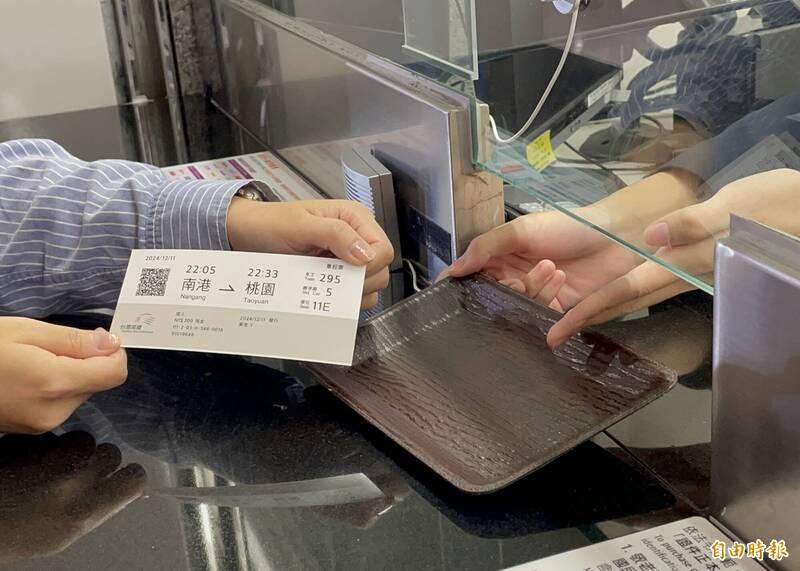New high-speed rail (HSR) paper tickets using QR codes and enlarged fonts are on sale from today at ticket counters in Nangang, Banciao and Chiayi stations, before being rolled out nationwide to replace the magnetic-strip system by the end of 2026, Taiwan High-Speed Rail Corp (THSRC) spokesperson Calvin Yen (顏昭立) said today.
The new ticket is double the size with lettering enlarged 1.5 times for the convenience of elderly passengers, Yeh said.
QR codes are to replace the original magnetic-strip paper tickets, saving 98 percent of the energy originally used per ticket at station barriers, he added.

Photo: Lin Chih-yi, Taipei Times
According to THSRC statistics, electronic tickets — including periodic tickets, return tickets, EasyCards and i-Passes — were used by HSR passengers a total of 28.11 million times, up 30 percent from 2022, he said.
As HSR tickets become increasingly digitized, the paper tickets have been designed for ease of use for elderly passengers, featuring a clear monochromatic design with a QR code clearly printed on the left-hand side and enlarged characters for important information in the center such as destination and departure time, Yeh said, adding that seating information is displayed on the right side.
The new tickets are to be issued at ticket counters at Miaoli, Tainan and Zuoying stations from Jan. 8, before being sold at all 12 stations on the HSR line in the first half of next year, he added.
As for self-service ticket machines, the new tickets are to be available at machines in Taipei, Taoyuan and Changhua from Wednesday next week, and at Taichung, Hsinchu and Yunlin from Dec. 24, with other stations adding the new tickets to self-service machines beginning in 2026, he said.
Until the end of 2026, both old and new versions of HSR tickets are to be accepted at all stations, he added.
The new design is also a step toward the company’s goal of operating a completely paperless ticketing system, Yeh said.

The inspection equipment and data transmission system for new robotic dogs that Taipei is planning to use for sidewalk patrols were developed by a Taiwanese company, the city’s New Construction Office said today, dismissing concerns that the China-made robots could pose a security risk. The city is bringing in smart robotic dogs to help with sidewalk inspections, Taipei Deputy Mayor Lee Ssu-chuan (李四川) said on Facebook. Equipped with a panoramic surveillance system, the robots would be able to automatically flag problems and easily navigate narrow sidewalks, making inspections faster and more accurate, Lee said. By collecting more accurate data, they would help Taipei

TAKING STOCK: The USMC is rebuilding a once-abandoned airfield in Palau to support large-scale ground operations as China’s missile range grows, Naval News reported The US Marine Corps (USMC) is considering new sites for stockpiling equipment in the West Pacific to harden military supply chains and enhance mobility across the Indo-Pacific region, US-based Naval News reported on Saturday. The proposed sites in Palau — one of Taiwan’s diplomatic allies — and Australia would enable a “rapid standup of stored equipment within a year” of the program’s approval, the report said, citing documents published by the USMC last month. In Palau, the service is rebuilding a formerly abandoned World War II-era airfield and establishing ancillary structures to support large-scale ground operations “as China’s missile range and magazine

A 72-year-old man in Kaohsiung was sentenced to 40 days in jail after he was found having sex with a 67-year-old woman under a slide in a public park on Sunday afternoon. At 3pm on Sunday, a mother surnamed Liang (梁) was with her child at a neighborhood park when they found the man, surnamed Tsai (蔡), and woman, surnamed Huang (黃), underneath the slide. Liang took her child away from the scene, took photographs of the two and called the police, who arrived and arrested the couple. During questioning, Tsai told police that he had met Huang that day and offered to

A British man was arrested for attempting to smuggle 14.37kg of marijuana into Taiwan through Taiwan Taoyuan International Airport, Taipei Customs said late yesterday. The man, who arrived from Bangkok at 9pm on Friday, was asked by customs officers to open his luggage during a random inspection, Taipei Customs said in a news release. The passenger, whose identity was not disclosed, refused to open his suitcase and tried to flee the restricted area. He was eventually subdued by three customs officials and an Aviation Police Bureau officer. A later search of his checked luggage uncovered 14.37kg of marijuana buds. The case was handed over